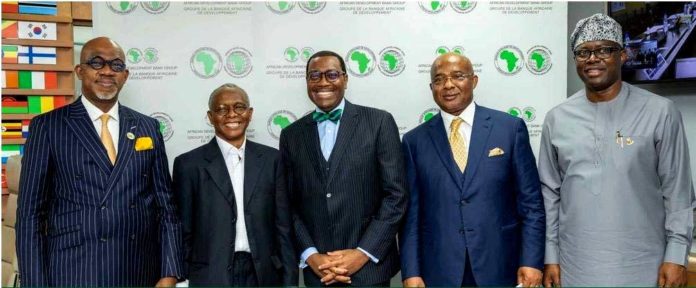African Development Bank President, Dr. Akinwumi Adesina, has reiterated that the special agro-industrial processing zones program that will soon get underway in seven states in Nigeria will be game-changers for agriculture in the country.
The African Development Bank set up the flagship SAPZ program to support inclusive and sustainable agro-industrial development in countries across the continent.
He disclosed this while receiving four Nigerian governors and the Chief Executive Officer of the Nigeria Sovereign Investment Authority (NSIA) at the Bank’s Abidjan head office, to discuss what will be the rapid rollout of the first phase of the Bank’s Special Agro-Industrial Processing Zones (SAPZ) program in their states.
The African Development Bank set up the flagship SAPZ program to support inclusive and sustainable agro-industrial development in countries across the continent.
The four Governors present at the meeting with the AfDB President and the NSIA Managing Director, Uche Orji, were Dapo Abiodun of Ogun state, Seyi Makinde of Oyo State, Nasir Ahmad El-Rufai of Kaduna State, and Hope Uzodinma of Imo State.
Dr. Adesina said “the special agro-industrial processing zones will be game-changers for agriculture in Nigeria. They will provide world-class infrastructure to support food agribusinesses to locate close to zones of production, develop competitive value chains supported by logistic systems that will drive food processing and value addition.
“The SAPZs will help create massive wealth and jobs in rural areas and turn rural areas away from being zones of economic misery to zones of economic prosperity.”
Adesina reiterated the African Development Bank’s commitment to Nigerian agriculture, which he said had the potential to be a powerhouse in food provision.
“Today is a very unique day for Nigeria at the African Development Bank,” Adesina said. “I must express how proud I am of the federal government, the executive governors, the ministries, and government agencies, for how this has all come together,” he concluded.
Last December, the Bank’s board of directors approved a $160-million loan to get the program underway in seven Nigerian states and Nigeria’s Federal Capital Territory.
Additional co-financing for the first phase of the program will come from the International Fund for Agricultural Development and the Islamic Development Bank in the amount of $150 million. The Nigerian government will provide roughly $18.05 million toward the program’s rollout and implementation.
Expressing great enthusiasm for the SAPZ program and enjoining his peers to take advantage of its value for development growth, Governor El-Rufai of Kaduna State said: “We are committed to the SAPZ program, all of us as governors, and I speak also on behalf of the President of Nigeria.”
Governor Abiodun of Ogun State said: “This promises to be a very successful and transformational initiative, for Ogun State and the country. This initiative is an important step toward reducing unemployment, a challenge that we face in Ogun State with the growing number of educated young people that are completing their studies with no jobs. There is a nexus between unemployment and insecurity.”
Adesina commended the governors for the enthusiastic manner in which they had embraced the program, enjoined them to continue to be the brilliant chief marketing officers for their states, and to share their ideas about how to attract private sector investment.
He also urged the Nigeria Sovereign Authority to develop a roadmap for the governors to follow in rolling out the initiative. “I want this to work at scale in Nigeria. We need to standardize and avoid being bureaucratic,” he said.
NSIA managing director Uche Orji stressed that agriculture was a key focus area of his agency. He said: “The NSIA pledges to work with governors to ensure that procurement is done professionally and on time.” He said the National Sovereign Investment Authority, owned 52% by states, and 48% by the federal government, would play a key role in the rollout of the program.
So far, the Special Agro-industrial Processing Zones project has already attracted significant interest from private sector food and agro-businesses in Nigeria. Investments of at least $1 billion are expected in these zones by the private sector.
NSIA Managing Director Uche Orji signed a letter of intent committing the agency to provide strategic assistance in procuring transaction advisory firms and other companies to implement world-class infrastructure in the hubs.
President Muhammadu Buhari is expected to preside over a ceremony in Nigeria in February to officially launch the first phase of the SAPZ program in the country. The presidents of the African Development Bank, the Islamic Development Bank the International Fund for Agricultural Development, and various investors are also expected to be present.








